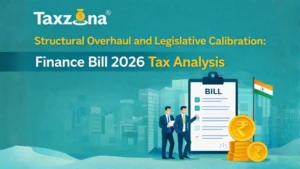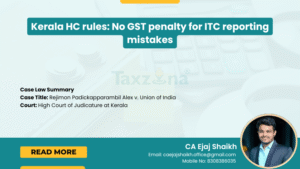Income tax is a type of tax that people have to pay to the government on anything they earn through paid work. Many countries have an income tax return filing in mumbai, which is collected as part of a progressive system and uses deductions, exemptions, and allowances to modify the amount of taxation owed by individuals. In this blog post, you’ll find all related information that’ll help you to understand five different types of heads of Income as defined in Income Tax Act, 1961
Income From Salary
Salary income, in India, includes all income received by an employee as a salary or wages in respect of services rendered to an employer. This includes fixed, recurring or stipend payments as well as commissions, tips and other amounts derived from work performed.
In addition, salary income includes any other remuneration that is clearly assigned as consideration for the performance of services.
The main categories of salary income that are taxable in India as per Income Tax Act, 1961 are:
– Fixed salary
– Commission based salary
– Tips and gratuities
– Profit sharing
– Performance bonuses
– Other forms of compensation
– Crop share income
– Rent received from occupier of immovable property owned by private individual (other than residential premises)
Under the Income Tax Act, all individuals who earn salary from a job are liable for income tax. This includes employees, self-employed people, and pensioners. In general, every individual who earns more than Rs 5,00,000 per annum is subject to income tax.
The basic exemption limit for financial year 2021-22 is Rs 2.5 lakhs as per Income Tax Act, 1961. This means that if your annual salary is more than Rs 2.5 lakhs and below Rs. 5 Lakhs, you are not required to pay any income tax on this salary.
Salary includes all remuneration that is received in cash or in kind, including commission, tips, bonuses, severance pay, and other similar payments. However, it does not include any benefits that are provided in connection with your employment (such as medical care and life insurance).
Income from House Property
House Property Income includes rental income from both residential and commercial property. Property rental income received from hotel, restaurant, amusement park and other businesses run by private entities is also treated as house property income as per Income Tax Act, 1961.
There is no concept of primary residence in India. thus all types of rental income such as rent from furnished accommodation, holiday lettings, short-term lease and contract work is taxable as per Income Tax Act, 1961.
However, Income derived on the resale of a house or plot of land after deducting allowable charges like registration fee, survey fee and stamp duty etc falls in the category of capital gains.
House property is taxable as per the Income Tax Act, 1961. The following are the criteria that must be met in order for house property to be considered as taxable income:
1) The property must be situated in India.
2) The property must be an asset of the individual.
3) The individual must be liable to pay tax on the income from the property.
4) The individual must have actually been in occupation of the property at any time during the year it is liable to tax.
5) The value of the property must be more than Rs 50,000 ( Rs 50000 if leased).
There are a few exclusions to this rule, however. These exclusions include residential premises occupied by members of the Armed Forces on active service or civil defence personnel in actual use; residence of a judge or member of an intellectual institution; and agricultural land having a value not exceeding Rs. 2 lakh ( Rs. 250000 if leased).
Income from Business & Profession
Income from business includes all forms of income derived from figures on a company’s Income Statement. This could include profits (or losses) from sales of products or services, rental income from properties owned by the business, dividends paid to shareholders (from companies that are publicly traded), and any other form of revenue generated. It’s important to remember that this definition includes both taxable and non-taxable income.
Taxable income is simply what’s subject to taxation by the government; non-taxable income is not taxed as per Income Tax Act, 1961.
Businesses (including sole proprietorships) are assessed income tax on their profits. Profits are the sum of all taxable income, minus all allowable expenses. The profit figure is then reduced by a necessary business expense deduction. This leaves the net profit figure as the taxable income for purposes of calculating income taxes.
Income from businesses and professions can include any form of income that is generated by an establishment or activity. This could include wages and salaries, commissions, royalties, startup costs, and other types of income. Additionally, income from businesses and professions can also include profits made from selling assets or products.
When calculating your income from business or profession in India, keep in mind a few important factors. First and foremost, you must take into accounting services all applicable taxes. Second, make sure to track your expenses carefully so that you can accurately determine your net profit. Finally, be sure to file correct tax returns so that your income is correctly reported to the government.
Capital Gains
In India, capital gains are taxable as per the provisions of Income Tax Act, Section 10(1)(a). This means that any gain or loss on the sale of an asset is taxable. The asset includes any share in a company, right or security, land, building and other movable property.
Capital gains is a term used in taxation that refers to the increase in the worth of an asset. An asset is anything that has value, apart from your own body. This includes investments such as stocks, real estate, mutual funds and properties.
When you buy an asset, the purchase price is more than the current value of the asset. The difference between these two values is known as your capital gain. If you sell an asset within a year of buying it, your capital gain is also known as short-term capital gain. If you hold onto the asset for more than one year, your capital gain is known as long-term capital gain.
There are several factors that determine whether an asset has increased in value or not. These include interest rates, inflation rates, market trends and other individual factors. However, one of the most important factors is whether you have taken any active steps to increase its value. This includes making any repairs or improvements to the asset, investing
Income from Other Source
Any other income, which is not categorized in the above source of Incomes, can be reported as Income from Other Source as per Income Tax Act, 1961. It includes Interest income from bank deposits, lottery awards, card games, gambling or other sports awards. These incomes are attributed in Section 56(2) of the Income Tax Act and are chargeable for income tax.
Conclusion for heads of Income in India
Above mentioned are the five types of Heads of Income defined under Income Tax Act, 1961 for computing Income Tax. This is the first step to identify your incomes in respective heads. If you need expert help in doing so, get in touch with our experts at Taxzona who will guide you in the best possible way to plan your income tax.








